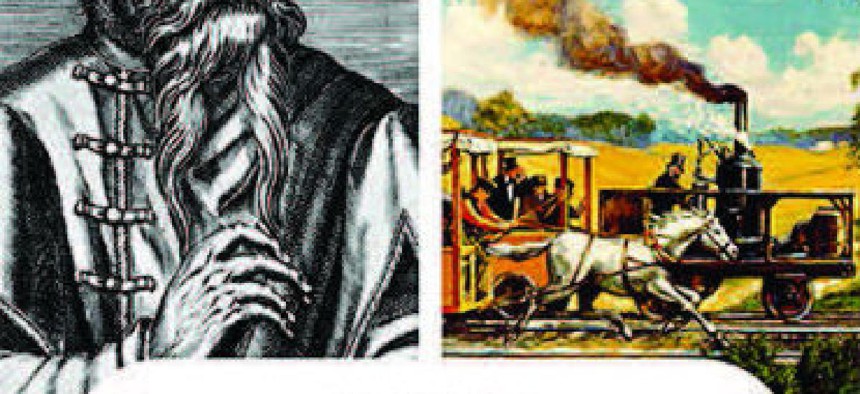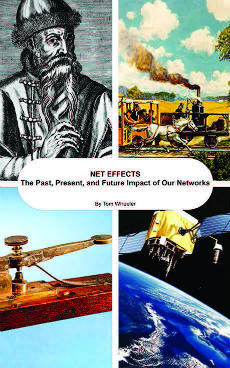FCC chairman spins history of communication -- and regulation

A free e-book from Tom Wheeler briefly details the 600-year-long story of the communications revolution and efforts by authorities to steer it for the 'public good.

There is a moment in the classic 1976 movie "Network" that has unfortunately been lost amid the four decades of people going to their windows and yelling about how mad they are and how they're not going to take it anymore.
"There is only one holistic system of systems, one vast and immane, interwoven, interacting, multivariate, multinational dominion of dollars," Ned Beatty tells Peter Finch.
One wonders what Ned would think of the Internet.
The "vast, interwoven, interacting" system we use today is the subject of a free e-book: "Net Effects: The Past, Present and Future Impact of Our Networks -- History, Challenges and Opportunities," by Federal Communications Commission Chairman Tom Wheeler. It is not quite a history of networks. At only 30 or so pages, it lacks the length for that. But it is a fair analysis of how networks through the ages have revolutionized society.
To achieve that in such a small space, Wheeler tells two stories: a brief history of networks and a brief history of the regulation of networks -- or how those in authority reacted to the revolutions.
He is on firm ground in the first half, where he traces four epochal inventions: the printing press, the railroad, the telegraph and the Internet.
The second half, where he dives into regulatory history, reads more like prepared testimony to be delivered at an Energy and Commerce Committee hearing: not uninteresting, but bureaucratic compared with the narrative that precedes it.
Wheeler views each of his four examples as a "hinge moment when the definitive activity of how we connect is being redesigned," and he hits the nail on the head with his choices. Printing turned the world upside down by diffusing knowledge and helping to topple centuries-old hierarchies. The railroad conquered the "tyranny of place" and gave the masses freedom of movement. The telegraph -- arguably the most revolutionary of all -- conquered not just place but time.
Richard John, a Columbia University professor and historian of communication, used Samuel F.B. Morse's 1844 invention of the telegraph as the dividing line in his history of the early postal service in "Spreading the News: The American Postal System from Franklin to Morse." Morse's telegraph was revolutionary in a way that no network before or since has been, a change in kind more than degree that allowed people to do something utterly new: interact with other people in real time in a different physical space.
Time, "which had always been a buffer to dull the sharp impact of change, became a casualty of the electronic network," Wheeler writes.
Everything that followed in the telegraph's wake -- the telephone, the radio, TV, the Internet -- could be considered, as Rabbi Hillel might say, mere commentary.
What separates the modern network revolution -- the Internet -- from its precursors is money. Movable type, the railroad and the telegraph were spurs to economic activity and enabled the growth of prosperity. In contrast, Wheeler asserts, the new networks are the economy.
And that, he writes, "places even greater importance" on the federal role.
Certainly, the federal government was heavily involved in developing railroad networks with subsidies and land grants. The birth of the modern regulatory state can be traced to the creation of the Interstate Commerce Commission in 1887. Morse was given tens of thousands of dollars by Congress to develop the telegraph, and he hoped that Washington would take ownership of the system (and hire him to run it).
Wheeler extolls the virtues of modern networks, citing in detail how they can be used in education and health care to make life better for all. He pays scant attention to phenomena such as Face-book and cat photos, however, and only gingerly approaches proposals for federal oversight of the Web without crossing any dark lines into "regulation of the Internet."
Wheeler is at his most expansive, though, when pondering the future.
Railroads and earlier networks helped define how we lived, where we lived and what kind of society we became. The same will be true of modern and future networks.
Old networks, while conquering space, centralized us. We gathered in one place to watch television or catch the train. Modern networks, Wheeler writes, "have turned the tyranny of place inside-out." Information now comes to us anywhere rather than us being tied to wired devices plugged into a wall.
The maps of modern cities, Wheeler writes, are "a network effect." Those maps are going to change over time because of the decentralizing nature of modern networks.
He also notes that networks change the political as well as the physical landscape.
Networks, while providing economic opportunity, also cause "economic dislocation." That provides another avenue for government to intervene.
It also annoys the masses, or at least some of them.
The old order always fights the new, even as it embraces the new technology to spread its message about how the new technology is evil. The year the telegraph was invented, an apocalyptic sect known as the Millerites predicted the world was going to end -- and used every modern technology available to get their message out.
That's how markets work.
And when markets fail? "The FCC has the responsibility to provide redress," Wheeler concludes.
Just keep your mitts off the cat photos. Otherwise, we might get mad as hell and not take it anymore.
NEXT STORY: 2020 census is counting on technology


